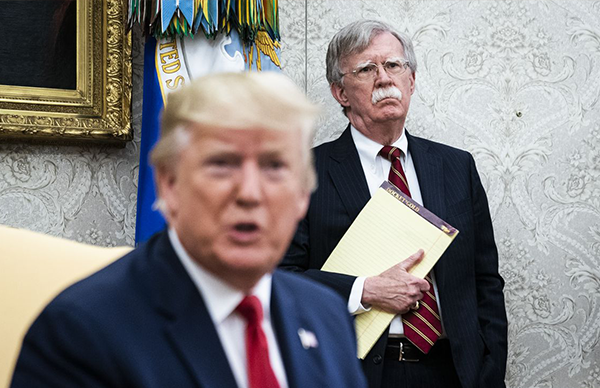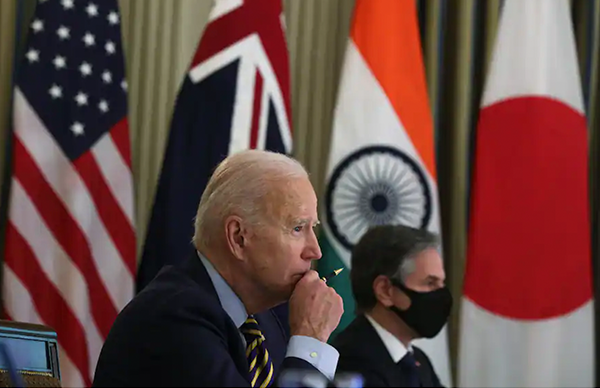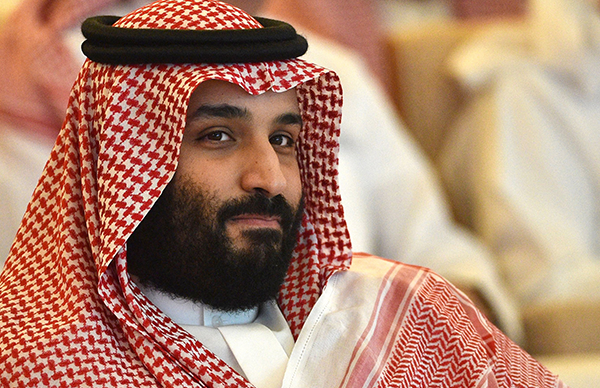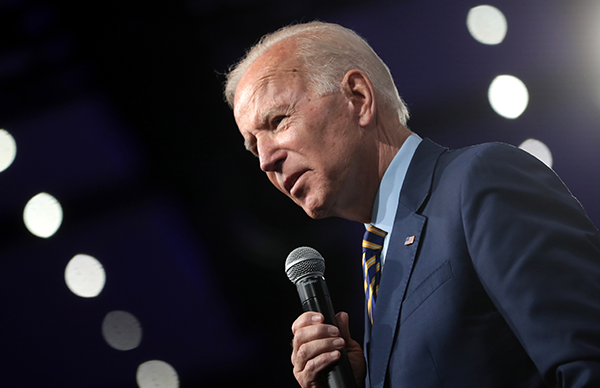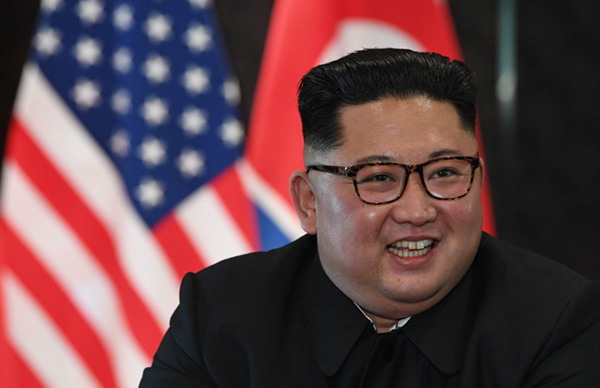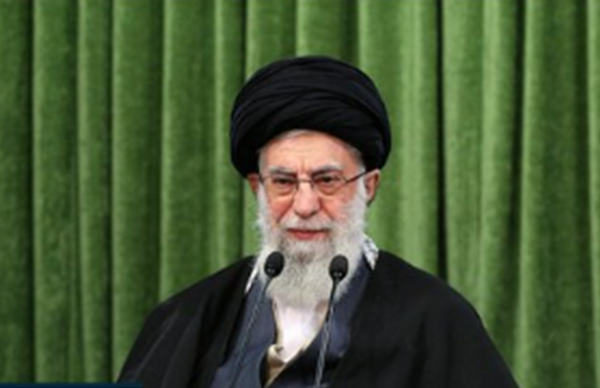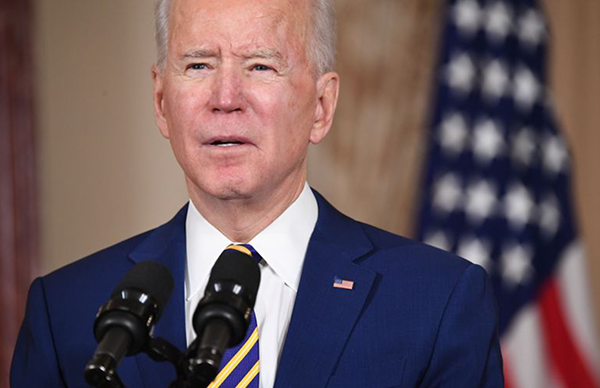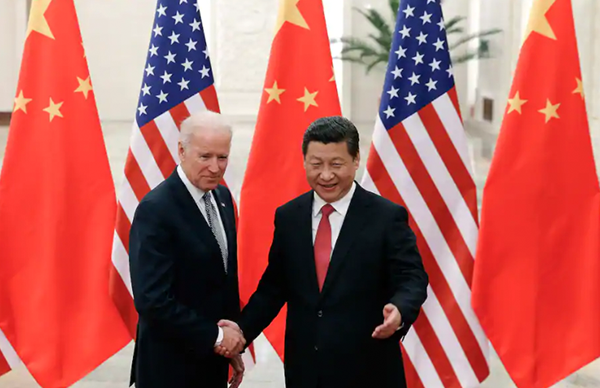By Dr. David Wurmser
March 10, 2021
Ever since September 2001, when 19 hijackers, the vast majority of which had connections to Saudi Arabia, killed over 3000 Americans, the unquestioned relationship with Saudi Arabia established during World War II has come under duress. It was not without reason. The Saudi role has neither ever been fully examined nor have significant Saudi leaders ever been held to account for their carelessness, even entanglement, in dealing with al-Qaida before the attack. And yet, two decades have changed the Middle East. The dangers posed by Iran are no less, and the new danger posed by Turkey’s leader, Tayyip Erdogan, the Muslim Brotherhood movement over which he increasingly exercises full control, and his alliance with Qatar swells every day. In the ensuing inter-Sunni cold war to seize the banner of Sunni Islam, Saudi Arabia is not just a key player, but also a major battleground.
Whatever reservations the United States may have either over the past, or over its war in Yemen, or the Khashoggi affair – all of which legitimately should result in harsh demarches and warnings to Riyadh – they must be tempered by the context of this dangerous rivalry. In this context, a Saudi collapse is potentially so catastrophic that it would lead to multiple 9-11s, a much worse crop of wars than Yemen, multiple external killings, internal sectarian bloodletting and likely a collapse into a horrific civil war the contours of which we have already seen in Syria. And it would launch not only Iran, but Turkey as well, into becoming regional superpowers challenged inside only by Israel and outside by the only superpower with the ability to project regional power, namely the United States. For those concerned with human rights, the collapse of Saudi Arabia should be of greater concern than the limited singular actions hitherto taken by Saudi Arabia to survive. It would be a repeat conceivably with far greater implications of the fall of the Shah and rise of Khomeini since ultimately Iran was a Shiite country in a Sunni sea, but the Muslim Brotherhood led Khaliphate of Turkey under Erdogan, who seeks to supercede and perhaps even control Saudi Arabia, is a Sunni nation in a sea of Sunnis. In this context, the Biden administration’s emerging hostility to Riyadh raises serious concerns about Saudi stability, and even more serious questions about whose side Washington is taking in the inter-Sunni cold war.
Saudi Arabia in 9-11
Let us be clear; Saudi Arabia has never fully cleared its account on al-Qaida and the 9-11 attacks. At the core, the point man of the Balkan cell from which sprang the Hamburg cell that executed the 9-11 attacks, was Muhammad Daroug, a man who spent many years abroad in Latin America and elsewhere, but always maintaining a strange relationship with powerful elements of the Saudi regime. An investigation of the relationship between Daroug, the Saudi Red Crescent and senior royals was never genuinely pursued. Indeed, at one point, so nervous was Serbia over the activities of the Saudi Red Crescent in this regard that they declared then-prince Salman (now King) a persona non-grata. And then there is the difficult connection between Turki al-Faisal’s intelligence agency where Saudi intelligence’s point man on al-Qaida was the brother of the Saudi point man in al-Qaida. In short, first for the sake of closure for the victims and second for the historical record, there must one day be an accounting of the highest level involvement in Saudi royal structures with the al Qaida structure.
And yet, although Saudi Arabia stalled any real accounting for what had happened before 9-11, in the years that followed it did understand the challenge that stood before it and worked aggressively to shut down the threat not only of al-Qaida, or even of the Salafi-based thought behind movements like al-Qaida, but even of the Muslim brotherhood. This effort was led by Muhammad bin Nayif (MbN), who became crown prince in 2015 but had led the security services long before that.
The rise of the inter-Sunni cold war
One of the most important moves that MbN made was in Syria and Egypt. During the years after the 9-11 attacks it seemed as if the Kingdom had reasserted its authority over the religious establishment and began to bring matters back under control, but the Arab Spring, and in particular the Syrian civil war’s eruption, unraveled that notion.
Signs emerged early in the Syrian conflict that regional Salafis encouraged by the Kingdom over the last half-century and their allies in Saudi clerical establishment – especially a powerful group dubbed the “Awakening Sheikhs” – had recovered from their suppression following 9-11 attacks and were again amassing power while at the same time disagreeing with several of the monarchy’s key strategic choices.
The Saudi family became particularly concerned that the Syrian issue – and support for the Salafi movement among Syrian oppositionists – was being leveraged by the remnants and new followers of the Awakening Sheikhs to act on their own in foreign policy (which is usually preserved within the authority of the leader the state), increase their following, and expand their base of power. Not only does this tread dangerously close to rearranging the balance between the leader of state (Saud) and leader of religious affairs (Wahhab) outlined under the 1744 pact, but such power could be used by the clerics to launch their own pro-Salafi “Arab Spring” in the Kingdom.
The Saudi government, thus, warned the clerics to stand down on Syria, and then took action. As early May 2012, the Kingdom banned fundraising activities for Syria, especially at the Bawardi Mosque in Riyadh which stood at the epicenter of these efforts, as well as blocked the “Ulema Committee to Support Syria” from functioning. Many of the clerics involved were summoned by Saudi authorities and warned to cease acting independently, even though the crisis in Syria was still an area in which there was a general convergence of views between the monarchy and these Sheikhs.
It was during this period as well that it became clear the Turkish leader, Tayyip Erdogan, had aligned with Qatar, assumed the mantel of leadership of the region’s Muslim Brotherhood movement, and sought to seize for himself the control of the banner of Sunni Islam. And an area where Erdogan and his Qatari allies saw greatest opportunity was in becoming the patron of the Sunni Islamists in Syria. Indeed, Qatar had long been a rival of the Saudi regime, and Turkey, imagining itself the new Khaliphate, was inherently on a collision course with Riyadh, which as the guardian of the two mosques (Mecca and Medina), laid claim to Sunni leadership.
In essence, the inter-Sunni Cold War found a fertile battlefield in which to play out. Saudi Arabia had tried to weaken and neutralize elements of its clerical establishment, the Ulema, who sought to leverage the war in Syria to build their power and influence not only independent of but adversarial to the monarchy. At first succeeded, but it was not long before Turkey and Qatar saw an opportunity to intervene and exploit these fissures between the Saudi royal family and the clerical establishment that ensured.
Moreover, events soon again spun out of control in Syria, partly because of Iranian efforts and partly because Qatar and Turkey began to prop up the worst Islamist tendencies in the Syrian opposition, including the troublesome Saudi clerics who worried Riyadh. Hezbollah’s overt intervention on behalf of the Assad regime in the battle of Qusayr in late May 2013 precipitated the sudden increase in Saudi foreign fighters in Syria. It was such a dramatic expression of Shiite/Alawite sectarian action against Sunni actions that it served as the clarion call for a new reinvigorated Sunni campaign across the Sunni Islamist universe. Less than a week later, in response, mainstream clerics such as the Qatari-based Yusuf al-Qaradawi called Sunnis to arms and fight in Syria: “anyone who has the ability, who is trained to fight…has to go; I call on Muslims to go and support their brothers in Syria.”
Most worrisome for Saudi authorities was that Qaradawi’s statement was later praised by Saudi Arabia’s Grand Mufti Abdul Aziz al-Shaykh. Two weeks after al-Qaradawi’s announcement, Saud al-Shuraym, a Saudi cleric at the Grand Mosque in Mecca, proclaimed that Sunni Muslims had a duty to support the Syrian rebels “by all means.” Before Qusayr, Saudi religious scholars supported helping the Syrian rebels through financial means, but were not overt in terms of foreign fighting. Hezbollah’s joining the conflict, the sectarianism that is intertwined in Saudi Arabia’s state religion and education, the clerical framing of the conflict as wajib (duty), campaigns of support for the rebels, as well as the summer months coinciding with the Muslim holy month of Ramadan all helped catalyze efforts to send Saudi fighters to Syria.
Combining its wealth and Wahhabi credentials, Qatar had assumed theological control over Hamas, the broader regional Muslim Brotherhood movements, and the Salafi world across the region. Even some al-Qaida linked Sheikhs – such the Saudi Sheikh, Dr. `Abd Allah bin Muhammad bin Sulayman al-Muhaysini, who is a theological force behind the Syrian Jabat al-Nusra movement – by 2014 expressed frustration over their loss of control of that end of the spectrum to Sheikhs funded and encouraged by Qatar (such as Sheikh Hajaj al-Ajmi).
But the rise of the Qatari-Turkish challenge again had the gravest implications not only for the Saudi royal family in Syria, but in the entire region. and the Saudi state it controlled. If the contours of the inter-Sunni Cold War – and the threat Qatar and Turkey sought to pose to the Saudi regime — had come into focus already over Syria, but then it escalated exponentially over Egypt. When Muhammad Morsi seized power from Hosni Mubarak in 2011, he aligned his regime heavily with the Hamas movement in Gaza, which by 2012 formally announced it was the Gaza chapter of the Muslim Brotherhood movement of Egypt. Moreover, he realigned Egypt as a whole to become one of Erdogan’s closest allies. Egypt had always been part of the inner circle of strategic concern for Saudi Arabia, and indeed, a hostile Egypt had before threatened the Saudi monarchy. Having Cairo aligned with the two primary rivals to Saudi Arabia, brandishing the banner of Sunni Islam under the banner of the Muslim Brotherhood, who were already threatening the Saudi monarchy from within through the rising “awakening Shaykhs,” was a threat Saudi Arabia could hardly countenance. Saudi Arabia, thus, dramatically in 2012 moved to declare the Muslim Brotherhood a terrorist organization, and all but overtly sided with Israel during its mini-war with Hamas that year. Indeed, two years later, Saudi Arabia threw caution to the wind and more or less did overtly side with Israel against Hamas.
Prince Nayif understood thus that, bringing about the end of the Muslim Brotherhood’s regime of Muhammad Morsi was a vital national interest. Saudi Arabia’s rising ally, the UAE and Riyadh accomplished this effort on July 3, 2013, when they helped General Muhammad al-Sisi seize power for Morsi and his Muslim Brotherhood allies. Beginning in summer 2013, the Awakening Sheikhs expressed publicly (or tweeted electronically) a critique of the monarchy’s overt support for Egypt’s coup. At first, Egypt’s Salafis and their Saudi comrades – both the royal family and the Awakening Sheikhs – had supported the crackdown against the Muslim Brotherhood, largely because they viewed the Brotherhood as rival claimants to the standard of Islamist authenticity. From the start, the relationship between the Saudi Kingdom and Egypt under Morsi and the Muslim Brotherhood had been tense. Apart from some theological differences, the Egyptian Brotherhood was working in close cooperation with the Turkish government under the AKP Islamist party and Qatar – a rival Wahhabi regime to the Saudis – to assert a leading regional role and define the nature of the emerging Arab Spring, often to the detriment of Saudi Arabia, which had invested great coin and effort for over 40 years into trying to crown its Salafis as the leaders of “authentic” Islam.
In contrast, the destruction of the Muslim Brotherhood by the military junta in July offered the Saudis a stalling if not even taming of the Arab Spring, and lent the Salafis and the Saudi colleagues the promise of monopoly over the Islamist camp. Understanding that the Salafis would be one of the benefactors of the coup, the Saudis thus calculated minimally, if at all, the possibility of a Salafi problem emerging from it. Indeed, if there was a concern at all, it was that the coup would stall and fail, and the Muslim Brotherhood would be left seizing the banner of the Islamist camp across the region – in cooperation with Turkey’s government – at the Salafis’ expense. It was, thus reasonable for the Saudi government to suppose the Egyptian coup would represent a convergence of interests between the Saud royals, the Awakening Sheikh clerics and the broader Salafi world.
Once the Brotherhood was removed from power, however, the Salafi camp moved to capitalize on discomfort surrounding the inherent brutality which the junta required to prevail in its crackdown. Tapping the chaotic and almost anarchic populist tendencies defining the politics of Tahrir square, and the still salient appeal of the authenticity of Islam, the Salafi camp drifted toward opposing the regime.
The emerging divergence of outlook and interests between the Salafi establishment – and their colleagues among Saudi “Awakening Sheikhs” – and the Saudi monarchy reverberates within the core of the Saudi state. Several key clerics have already split with the monarchy over its support for the Egyptian junta. Indeed, two prominent Sheikhs, Salman al-Awdah (who had been arrested and incarcerated before until 1999, but since has been viewed as loyal to the Saud) and Muhammad al-Urayfi have been silenced following twitter posts criticizing support for the Egyptian coup. Sheikh al-Awda’s internet journal, Islam Today, has been removed from the internet. Another popular cleric, Muhsin al-Awaji has been arrested; there were reports over the last year that Sheikh al-Urayfi (who has the highest number of internet-based followers in the Kingdom) has also been arrested.
Other key clerics – Nasser al-Omar, Hassan Hamid, Abd al-Aziz bin Marzuq al Tarayfi, and Abd al-Rahman Salah Mahmud – have also been detained, threatened or harassed by the Kingdom’s police. Given how nervous the al-Saud family is over the increased power of the Awakening Sheikhs in the context of Syrian policy – over which they are in agreement – one can only imagine how dangerous the monarchy regards increasing vociferousness among these clerics on the issue of Egypt – over which they disagree.
In the end, torn between its geostrategic interest in supporting the Egyptian coup and its governing interest in avoiding a rupture with elements of its clerical core, the monarchy suppressed the most vocal Sheikhs but simultaneously negotiated with the broader clerical establishment to reconcile their conflicting interests.
And yet, all was not well in the Kingdom. Oil prices were plunging, and it was increasingly obvious that Saudi Arabia’s economy as constituted was too distorted by oil wealth to survive in the long run, and Saudi society was woefully unprepared to deal with the sort of modernity an effective economic transformation would demand.
In the next part of this essay, we will examine how the conflict between Turkey and Qatar on one hand, and the Saudis on the other moved to the center of the Saudi regime and threatened its very survival, with Adnan Khashoggi’s assuming a critical role in the Turkish strategic campaign.
i HTTPS://WWW.CTC.USMA.EDU/POSTS/THE-SAUDI-FOREIGN-FIGHTER-PRESENCE-IN-SYRIA
ii ACCORDING TO AL-MUHAYSINI’S AUTOBIOGRAPHY, HE WAS BORN IN BURAYDAH (QASSIM REGION) IN NORTH-CENTRAL SAUDI ARABIA. HE BECAME A HAFIZ (ONE WHO HAS MEMORIZED THE ENTIRE QUR’AN) BY THE AGE OF 15. FOR HIS BACHELORS STUDIES, HE MAJORED IN SHARI`A AT THE UNIVERSITY OF UMM AL-QURA IN MECCA. HE LATER COMPLETED HIS MASTER’S AND DOCTORATE IN COMPARATIVE FIQH (ISLAMIC JURISPRUDENCE) AT AL-IMAM MUHAMMAD IBN SAUD ISLAMIC UNIVERSITY IN RIYADH, WRITING HIS DISSERTATION ON LEGAL PROVISIONS AFFECTING WAR REFUGEES IN ISLAMIC FIQH. HE STUDIED UNDER A NUMBER OF SHAYKHS, INCLUDING THE CONTROVERSIAL SHAYKH SULAYMAN AL-ULWAN WHO WAS ARRESTED BY SAUDI AUTHORITIES IN 2004 FOR SUPPORTING AL-QA`IDA.
